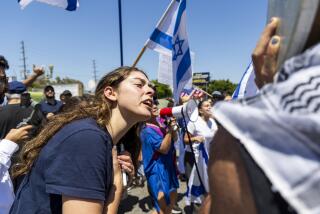Making Strides Toward a Renewal
- Share via
Aaron Brown once was an alcoholic; now he is sober. Brown was once estranged from his two children; now he is a devoted father. Brown was once homeless and unemployed; now he has a job as a restaurant manager. Brown was once an atheist; now he is a Christian. Brown was once arrested for assault; now he espouses nonviolence.
Brown decided to participate in a march for Christian men Thursday evening to show others that they, too, can transform their lives.
“I wanted to show the young men in our community that taking care of your families and devoting your life to God--that’s what being a man is all about,” Brown said, as he marched in South-Central Los Angeles with about 300 other men.
“I’ve made big mistakes in my life. Hopefully, this march can influence other young men so they don’t make the same mistakes.”
Mark Whitlock, an official at Los Angeles’ First African Methodist Episcopal Church, said the march was a way to protest the violence that plagues South-Central, and a way to show that many men in the area are not violent.
“We’re asking men to stop the violence against women,” he said. “We’re asking for the gang violence to stop. We’re asking for the violence between the African American and the Latino community to stop. The African American male must adopt a new image that compels people to work hard and create a strong economic foundation, not an image that repels people out of fear.”
The marchers sang religious songs and carried placards that read: “Christian Men Marching Into a New Day,” and “Brothers stop hurting brothers. Men stop hurting women. Blacks stop hurting browns.”
The march started at Ward AME Church in the 1100 block of West 25th Street, where the 74th annual conference of Southern California African Methodist Episcopal churches was held during the past week. The two-mile route ended at the First AME Church.
Marches exclusive to black men were popularized by the 1995 Million Man March in Washington, D.C., sponsored by Nation of Islam leader Louis Farrakhan.
That procession spawned local African American marches in cities throughout the nation.
“We want people to look at the fact that we have black men in South-Central who have businesses,” said the Rev. Norman Copeland Sr., pastor of the 3,000-member Ward AME Church.
“They sponsor basketball leagues, baseball teams, they’re coaches, they’re going to work every day and paying taxes.”
County Supervisor Yvonne Brathwaite Burke said at a Thursday morning news conference promoting the march: “We’re going to march for peace . . . against domestic violence, and we’re marching for peace among gangs.”
Sheriff Sherman Block said any march that rallies ordinary black men to the aid of ordinary young black males is important in his eyes.
“Prominent athletes shouldn’t be role models,” Block said. “We see young people striving for something that’s not attainable and winding up frustrated. They haven’t established roots in the community. They fail and end up angry and turn on the rest of society.”
More to Read
Sign up for Essential California
The most important California stories and recommendations in your inbox every morning.
You may occasionally receive promotional content from the Los Angeles Times.













